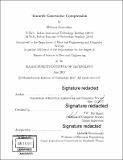Towards generative compression
Author(s)
Santurkar, Shibani (Shibani Vinay)
DownloadFull printable version (11.24Mb)
Other Contributors
Massachusetts Institute of Technology. Department of Electrical Engineering and Computer Science.
Advisor
VNir Shavit.
Terms of use
Metadata
Show full item recordAbstract
Graceful degradation is a metric of system functionality which guarantees that performance declines gradually as resource constraints increase or components fail. In the context of data compression, this translates to providing users with intelligible data, even in the presence of bandwidth bottlenecks and noisy channels. Traditional image and video compression algorithms rely on hand-crafted encoder/decoder pairs (codecs) that lack adaptability and are agnostic to the data being compressed and as a result, they do not degrade gracefully. Further, these traditional techniques have been customized for bitmap images and cannot be easily extended to the variety of new media formats such as stereoscopic data, VR data and 360 videos, that are becoming increasingly prevalent. New compression algorithms must address the dual constraints of increased flexibility while demonstrating improvement on traditional measures of compression quality. In this work, we propose a data-aware compression technique leveraging a class of machine learning models called generative models. These are trained to approximate the true data distribution, and hence can be used to learn an intelligent low-dimensional representation of the data. Using these models, we describe the concept of generative compression and show its potential to produce more accurate and visually pleasing reconstructions at much deeper compression levels for both image and video data. We also demonstrate that generative compression is orders-of-magnitude more resilient to bit error rates (e.g. from noisy wireless channels) than traditional variable-length entropy coding schemes.
Description
Thesis: S.M., Massachusetts Institute of Technology, Department of Electrical Engineering and Computer Science, 2017. Cataloged from PDF version of thesis. Includes bibliographical references (pages 47-51).
Date issued
2017Department
Massachusetts Institute of Technology. Department of Electrical Engineering and Computer SciencePublisher
Massachusetts Institute of Technology
Keywords
Electrical Engineering and Computer Science.